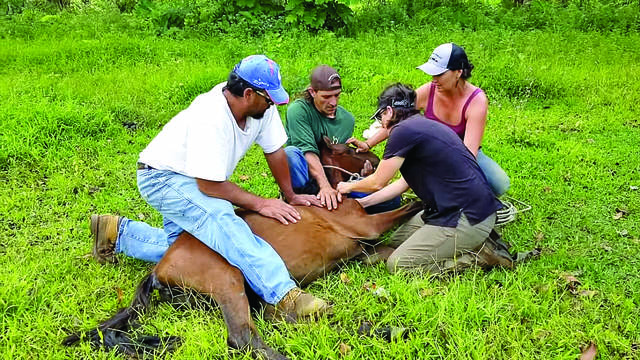KAILUA-KONA — A battery of tests now completed, several veterinarians from throughout Hawaii and the country are still unable to pinpoint the deadly malady that claimed the lives of 13 wild horses in Waipio Valley between June and July.
In a Friday release from the state Department of Agriculture, veterinarians were able to determine that no infectious disease of any sort was the perpetrator and “…that the incident may be attributed to possible exposure to a toxicological event.”
Veterinarians from the DOA, the University of Hawaii at Manoa College of Tropical Agriculture and Human Resources and Big Island veterinarians such as Kelleyerin Clabaugh, who was the first veterinarian to begin investigation, and Tim Richards, also a county council member, took part in the investigations that followed.
Richards, who is a rancher and has worked with large animals for years, examined a wild horse the DOA euthanized before sending off samples for testing. He said in July he’d never seen anything like the symptoms the horses presented — weakness in the hind limbs that led to muscle atrophy, an abnormal gait and, ultimately, an inability to stand.
Researchers with the Daniel K. Inouye College of Pharmacy at UH-Hilo and veterinary toxicologists and pathologists from the mainland also tested for a variety of potential neurological causes, only to come up empty, the release said.
“This disease investigation into the cause of the deaths of these wild horses is one of the most extensive in Hawaii in my recollection,” said Jason Moniz, DVM and manager of HDOA’s Animal Disease Control Branch, in the release. “In addition to the veterinarians, laboratories and researchers who worked on this case, we appreciate the help of Waipio Valley taro farmers who provided assistance, observations, information and feedback and who showed sincere concern for these horses.”
Infectious equine diseases were negative, the release continued.
“Equine pathologists found mild inflammation of the horse’s brain, but it was not deemed significant enough to cause the deaths,” the release stated. “Two small lesions found in the spinal cord appeared old and were also determined insufficient to cause significant neurologic disease or death.”
While evidence of rat lungworm disease was present in test results, investigators concluded the damage to the horse’s brain and spinal cord couldn’t be reliably attributed to an active rat lungworm infection.
There also was reportedly a small hydraulic fluid spill in the area of Waipio Valley the affected horses were known to populate, and depressed nerve tissue enzymes lent credence to the idea that could have contributed to the horses’ deaths. Such a depression is possible after organophosphate exposure or exposure to a variety of insecticides and other chemicals.
While organophosphates are present in some hydraulic fluids, investigators ruled out this possibility upon microscopic evaluation of the horse’s nerve tissue.
The release said muscle and fat atrophy indicated parasites found in the wild horse’s intestines might have contributed to its malnourished appearance. However, they wouldn’t explain other clinical signs arising from the still-mystery source of the animals’ atrophy and death.
Liver and muscle damage consistent with the parasitic presence in the horse’s intestines was discovered via blood tests. Investigators will administer further tests to check on the nature of a microscopic parasite that was found in some of the horse’s muscles, “so its significance can be determined.”
If toxins do prove to be the issue, veterinarians have been unable to determine their source.
Those who frequent the valley guess about 50-60 wild horses roam there in five distinct groups, or bands. The horses that fell ill were part of the same band that inhabited a portion of the west side of the valley, according to the DOA.
The DOA asks members of the public to report to the state veterinarian’s office any other health problems they notice in horses that populate Waipio Valley. The office can be reached at 483-7100.
A detailed report of tests and findings is available at http://hdoa.hawaii.gov/ai/main/wildhorses.
Email Max Dible at mdible@westhawaiitoday.com.






